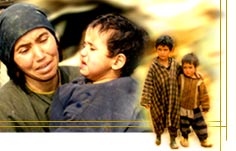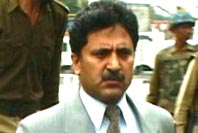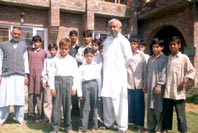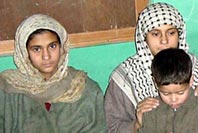
The Kashmir conflict, which killed at least 35,000 people since 1989, has sired a generation of children lost to hate and fear. They grow up in the no man's land between politics and war. This series focuses on them, the children of an unfortunate conflict.
By CHINDU SREEDHARAN
|
• About This Series • Page 1 • Page 2 • Page 3 • Page 4 • Page 5 • Page 6 • Page 7 • Page 8 • Page 9 • Page 10 
Related Specials • Blood in the snow • A soldier's story • This is Kashmir! • Children of Kashmir • Valley of darkness More |
[You are on page 2 of this series. Read the previous page.]
AMONG the orphans too there are the lucky and the unlucky. In that limited sense, Vinod Kumar belongs to the former category.
As a result, the authorities took enough interest in Vinod Kumar to ensure his material needs are taken care of. Today he is secure in a government-funded school somewhere in north India, and though not doing well at studies, the ghosts of that January night haunt him not all that often. But for his brethren back home, children whose parents were killed in routine violence, there is still no escape. They survive in the same atmosphere that orphaned them, amidst death, helpless. Among them, again, are subdivisions, depending on how/by whom they were orphaned. Thus, we have children whose parents have been killed by militants and those orphaned by security forces. And of victims of circumstances, those who were at the wrong place at the wrong time -- 'collateral damage,' as the military defines them. The majority of orphans are children of civilians caught in crossfire, Kashmir observers said. A UNICEF study, The Impact of Armed Conflict on Children, supports this. Accordingly, in recent decades the proportion of war victims who are civilians has leapt dramatically, from five per cent to over 90 per cent. "Around 60 per cent would be the children of civilians caught in one crossfire or the other," said a bureaucrat. "Those whose parents have been killed by militants and security personnel would be nearly the same."
You are eligible for these, however, only if you can produce a 'non-involvement' certificate from the state police, absolving your parent of any association with militancy. And this rules out many orphans created by the security forces. But even for the rest, the children of innocent civilians, the relief is a mirage today. In the last one-and-a-half years, no allowance has been paid out, no new cases registered. Even the backlogs, some as far back from as 1992, have been kept pending. "No funds," said a weary Dr G M Untoo, executive director of the Council for Rehabilitation of Widows, Orphans, Handicapped and Old Persons (Victims of Militancy) in Jammu and Kashmir, created by the Centre and state governments in 1996. "The promised money has not arrived." An academician, Dr Untoo sits in the highly protected, well-appointed New Secretariat while in Srinagar. Though the location is a statement about the importance of his assignment (mostly key bureaucrats, including the chief secretary of the state have offices in the New Secretariat; the others function from the Old Secretariat), his cluttered, one-room office, which he shares with his personal staff, endorses the power he does not wield.
"In 1999, we had assigned the district commissioners a survey of militancy-hit victims in their respective areas," he said. "We still haven't received those."
Naseema's father Abdul Ahad Punjabi was a tailor. He went to work early one day, promising to return for lunch. By noon a group of solemn men reached his body home. Naseema came to know how her father died only six years later. Two militants had entered his shop and fired over his head, through the window, at someone outside. Punjabi was not shot, but the incident killed him. He gulped down a glass of water, fell down, and died of a heart attack. Ironically, the militants' intended victim, a Hindu Pandit1, though shot in the stomach, survived. The strange circumstance of the death robbed Naseema's family of the monetary help it would otherwise have got (technically Punjabi was not a 'victim of militancy') and highlighted an inadequacy in the government's relief plan. It also created six orphans who live all the troubles their particular status in Kashmir throws at them: economic, social, physical and psychological.
"But our neighbours forced him to give us Rs 10,000," Naseema said. "That was the last we saw of him. We have been staying on our own since then." The Rs 1,200 Naseema's mother Raja brings home as a peon at a local school every month, and the little money her [Naseema's] twin Zamrooda earns as a housemaid are just about enough for a half-hungry, undernourished existence. Which probably is why the sickly Zamrooda replied when asked what she wanted the most, "We should have money, a house. There should be enough food in the house... And nobody should be killed." In a land where the gun is the law and lawlessness, molestation and rape common, Raja is worried about seeing her daughters married off safely. But being an orphan carries with it its own social stigma in Kashmir, more so if you are poor. "I am worried sick about them. I sleep in their midst, holding one or the other," she said. "Every night before we go to bed I pray we are not disturbed6. "Till now we have been saved. But in Kashmir, everyone knows anything can happen anytime... If I had the money I would have married off at least two somehow." Naseema put their tragedy succinctly. "When my father was alive we were happy. Nobody harassed us. We had food and clothes," she said. "Now there's nothing." Page 2: What We Can Do For The Orphans Return to the previous page.
This article is part of Chindu Sreedharan's study on the Impact of Militancy on the Children of Kashmir, as a National Foundation for India Fellow for 2000-2001. Page Design: Rajesh Karkera |
(c) 1996 - 2001 rediff.com India Limited. All Rights Reserved.


